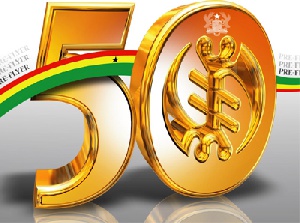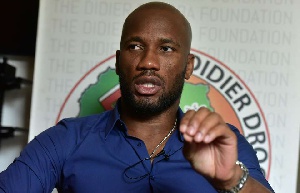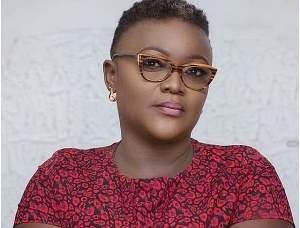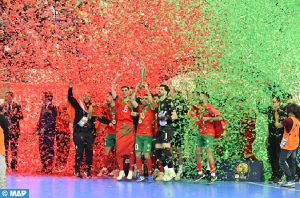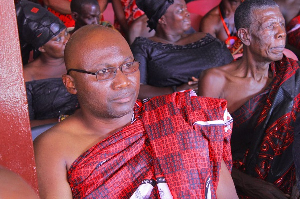- Home - News
- TWI News | TV
- Polls
- Year In Review
- News Archive
- Crime & Punishment
- Politics
- Regional
- Editorial
- Health
- Ghanaians Abroad
- Tabloid
- Africa
- Religion
- Election 2020
- Coronavirus
- News Videos | TV
- Photo Archives
- News Headlines
- Press Release
Opinions of Saturday, 24 February 2007
Columnist: Nkrumah, Jermaine
Ghana @ 50 - A Reflection
How do you reflect fifty years back, and you are only, well, less than fifty? There are several ways to do it. You can begin by researching what has been written in books or what other politicians have said in the past, both of which are likely to be subject to a slant. More so, it would not be a reflection; it would just be another academic endeavor that dilutes the real essence of how we got from colonial rule to fifty years of self rule – a first in sub-Saharan Africa.
Even though I was born earlier, my eyes did not really open until the middle of the 1960’s. Our first leader, Osagyefo Dr. Kwame Nkrumah had just been overthrown, and the government had been taken over by some gun-totting soldiers. It is hard to understand why Nkrumah was removed from office for doing what was then, and still is, considered a good job. Could it be that we simply did not know the magnitude of the work he did, or we were itching to put into use the art of overthrowing a government ironically taught by England, a country that has never utilized this art? After he successfully led the fight to free the then Gold Coast from British colonization, his perspective shifted to freedom for the rest of the African continent. Considering the perceived threat posed to the west by a vigorously pursued united Africa, Nkrumah’s removal from office while he was on a United Nations peace mission to Vietnam came as little surprise to many. What was not surprising, however, was the chain reaction and the precedence it created in Ghana.The coup plotters would eventually hand power over to the democratically elected government of Dr. Kofi Abrifa Busia in 1969. Three years later in 1972, another soldier seized power and redefine incompetence at the highest level for six years before his own henchmen removed him in a palace coup. They lasted a year before a group of young army officers in turn removed them in 1979. To show their good intention, these young officers quickly supervised a national election and handed over the affairs of the country to the democratically elected government of Dr. Hilla Limann.
When one of those young soldiers turned around and overthrew Limann’s government on the very last day of 1981, his broad support, which had earned him the nickname ‘Junior Jesus,’ literally evaporated. To maintain power amidst the lack of popularity, he would rule dictatorially, repudiate the west, and align with the likes of Moumar Ghadafi of Libya and Fidel Castro of Cuba, both of who were darlings of the then Soviet Union. Curiously, the year 1989 when the Soviet Union unraveled was the same year in which this young soldier finally agreed to a democratic process that eventually led to him being elected as the president of the Fourth Republic of Ghana in 1992.
President Jerry John Rawlings would be re-elected in 1996, but he disappointed critics by actually ceding the presidency when John Agyekum Kufuor defeated his Vice President in the 2000 election decided by a run-off. It is noteworthy that the western media invaded Ghana ready to broadcast to the rest of the world yet another African country that exploded into chaos over election dispute because the expectation was that Rawlings would not give up power. When the bloodshed did not materialize, they packed up and left without just as widely broadcasting that an African country can actually be civil enough to avoid civil war over an election. To date, Ghana still has that to be proud of.
The current president also won re-election in 2004. And in the final two years of his term limited administration, President John Agyekum Kufuor gets to preside over a 50-year-old African country that has seen its share of military takeovers of government, but which has endured with dignity all the pains associated with those experiences. Throughout its history, Ghana has also seen its share of tribal discrimination and hatred in certain unfortunate circumstances. Yet tolerance and restraint have always reigned supreme.
Thus, it can be said that the first previously colonized African nation to attain 50 years of independence is also one of the very few to have not endured the tribulations of civil conflict. As a nation, Ghana may not have kept pace, in terms of economic development, with the Malaysia’s and the Indonesia’s that also obtained their independence around the same time that we did. At the same, given the environment in which we grew as a nation, and what we have been able to achieve together, we have more to be proud of than to be ashamed of. That is why we must all sit back, take a deep breath, and enjoy this day, the 6th of March in the year of our Lord 2007. We all deserve it.

